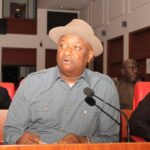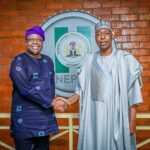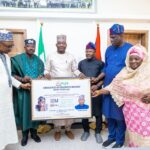––Call For Establishment Of Sector’s Regulatory Commission
With support from Ford Foundation, the Nigerian Economic Summit Group (NESG) has developed and launched a diagnostic report on the Nigerian mining sector.
The NESG and Ford Foundation diagnostic report on the state of the solid minerals sector in Nigeria critically examines the status, strengths, weaknesses and opportunities for improvement in the nation’s mining sector.
Making his presentation at the launch of the Report in Abuja, Prof.Gbenga Okunlola, a Steering Committee member, Manufacturing and Mining Policy Commission of the NESG, called for the re-organisation of Ministry of Mines and Steel Development (MMSD) as well as the establishment of the regulatory commission for the sector.
Okunlola, who is also a Professor of Geology and Earth Science, University of Ibadan, identified weak and inconsistent implementation of laws, policies and strategies; low level of enforcement of compliance with technical, environmental and social obligations in the informal ASM sub-sector; absence of an independent regulator shielded from political interference as well as lack of attention to gender issues in the mining sector under the NMMA as some of the weaknesses in the sector.
He recommended that the issue of transparency and accountability in the mining licensing framework should be addressed, including the upgrade of mining license issuance conditions to include disclosure requirements as well as the establishment of the Nigerian Mineral Reporting Code Act.
He noted that the increase in the mining sector’s activities and output was projected to increase revenue diversification, economic growth and acceleration through backward, forward, spatial, fiscal linkages and knowledge interconnections.
Okunlola therefore, called for the development of a “more comprehensive, inclusive and participatory national strategy and policy in line with African Mining Vision(AMV), National Development Plan(NDP) 2022–2025, Agenda 2050 and Sustainable Development Goals(SDGs).
He also advocated the strengthening of institutional framework for the mining sector to ensure regulatory effectiveness and efficiency and improvement of investment climate for the sector as well as the establishment of an inclusive and participatory mineral resource federalism framework under the Constitution where the three tiers of government have clear roles in order to create an enabling environment for private sector investments.
As part of the recommendations of the diagnostic report, Okunlola sought the amendment of Nigerian Minerals and Mining Act(NMMA) and Nigerian Minerals and Mining Regulation(NMMR) to address identified gaps in the mining sector’s legal and regulatory institutional framework that are preventing the country from maximising it’s potential and integrate the mining sector with the rest of the Nigerian economy by developing backward, forward, lateral linkage strategies in line with the African Mining Vision(AMV).
The Nigerian Solid Minerals industry is one of the potential employment-generating sectors with a vast capacity to bridge government’s revenue gaps, promote inclusive growth and supporting economic structural transformation.
A minerals-abundant nation, Nigeria is endowed with over 40 different solid mineral types found in about 450 locations scattered across the country.
Underscoring opportunities for growth, the sector is projected to drive the government’s diversification agenda at a scale capable of supporting the pulling of 100 million Nigerians out of poverty by 2030.
In his remarks, the Representative of Ford Foundation, Mr. Emmanuel Kuyole, said there is much focus on the oil and gas sector of the economy, adding that priority attention should be given to mining sector for economic diversification and poverty reduction.
Kuyole noted that Ford Foundation was interested in the documentation of the Diagnostic Report in the mining sector because of its timing and moving away from high carbon to low carbon future.
He pointed out that the transition from high carbon to lower carbon future would be driven by minerals.
He added that as the incoming administration thinks of how to diversify the economy to create jobs and generate revenue, it is imperative that the mining sector should be given prominence and consideration.
He expressed optimism that through the implementation of the recommendations of the report that Nigeria would re-write the wrongs done to the communities where extractive activities take place.












